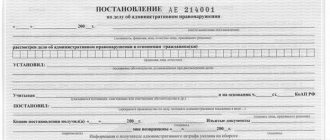The Russian Federation adopted Federal Law No. 64 of 04/06/2011 “On administrative supervision of persons released from prison,” which regulates issues of administrative supervision of persons released from prison.
This supervision consists in the fact that regulatory authorities monitor that a person who has been released from prison complies with the restrictions on his rights and freedoms established by the court, and also fulfills the duties provided for by law.
ATTENTION : our criminal lawyer in Yekaterinburg will help in the matter of appealing administrative supervision, its removal: professionally, on favorable terms and on time. Call today!
Maximum period of administrative supervision
The maximum period of supervision depends on the severity and composition of the crime committed by the person in respect of whom supervision is established.
If the person was:
- a grave or particularly grave crime has been committed;
- there was a relapse of crimes;
- the person has committed two or more crimes under the articles provided for in the law relating to crimes involving narcotic, psychotropic substances,
Administrative supervision can be established from 1 year to 3 years, BUT this period cannot exceed the period for expunging a criminal record, which is established by law.
If the person has committed:
- intentional crime against a minor;
- a crime related to the sexual integrity and sexual freedom of a minor;
- there was a dangerous or especially dangerous relapse;
- a crime was committed under the articles listed in clause 3, part 2 of art. 3 of Law No. 64, related to murder motivated by political, racial hatred, terrorist acts and other similar crimes;
- if the person was under supervision and during this period committed a crime for which he was sentenced to imprisonment and was sent to serve the sentence,
Administrative supervision is established for the period established by law for expunging a criminal record.
If a person over the age of 18 has committed a crime related to the sexual integrity of a minor who has not reached 14 years of age, and who is a pedophile, and his sanity is not excluded, supervision is established for the period for which compulsory measures of a medical nature are assigned to him, BUT In this case, such a period cannot be less than the period for expunging a criminal record, which is established by law.
The maximum period for expunging a criminal record is set at 10 years after the person has served his sentence, respectively, taking into account the above provisions of Law No. 64, the maximum period for which supervision can be established is 10 years, it all depends on the severity of the crime committed.
IMPORTANT : it is worth noting that supervision cannot always be established if a person, for example, has committed a serious crime. For more information on when supervision is required, see the section “How to avoid supervision after release” below.
Law No. 64-FZ on supervision: the essence of the procedure and methods of its implementation
Administrative supervision is the process of monitoring persons who have been released from prison, but have not yet expunged their criminal record. The purpose of the procedure is to control the behavior of criminal elements who have served their sentence, as well as to monitor their actions and verify their compliance with the provisions of the law.
Important! The main task of supervision is to prevent previously convicted citizens from committing further crimes. Control is also carried out to provide preventive influence on violators in order to protect the state and society.
The regulations for the implementation of the process are established by Law No. 64-FZ. Additionally, but in a more concise version, its provisions are duplicated in Art. 173.1 Penal Code of the Russian Federation.
In reality, control measures take the form of a system of restrictions on rights and freedoms, temporarily launched in relation to a released convict. Here we are talking about various kinds of prohibitions, as well as responsibilities imposed on each specific violator individually.
So, in practice and on the basis of Art. 4 Federal Law No. 64, the following options for implementing supervisory measures are used:
- ban on visiting and staying in certain institutions and places;
- mandatory attendance for registration marks – from 1 to 4 times a month;
- ban on visiting or participating in public events;
- complete restriction of the possibility of leaving the home at a specific time of day (usually night hours - from 22.00 to 6.00);
- prohibition of travel outside the locality or country.
Regular monitoring of prisoners' compliance with restrictions is carried out by internal affairs bodies. The unit for mandatory attendance is appointed in accordance with the place of permanent or temporary residence of the supervised person or taking into account the place of his actual residence. The latter is understood as the territory of a city, district, rural settlement, chosen by a person released from a colony who does not have a real place of residence.
How to remove supervision after release?
After release, the person may be placed under supervision for a certain period of time. Is it possible to remove it before the expiration of the period for which supervision is established? Can. Law 64 provides for the possibility of terminating administrative supervision early under a combination of certain factors:
- the application is submitted to the court of the Department of Internal Affairs - by the supervised person or his representative;
- before going to court, at least half of the administrative supervision period must have expired;
- During the period that a person is under supervision, he must faithfully comply with the restrictions, fulfill the duties prescribed by law and have a positive character.
The court considers the application for early termination of supervision and if it concludes that there are all grounds to satisfy the application, it issues an appropriate judicial act.
INTERESTING : read how to remove a criminal record from the CI database using the link
Analysis of the rights and obligations of the supervised person: Chapter 3 of Law No. 64-FZ
A separate clause in Law No. 64-FZ includes the rights and obligations of supervised citizens. This point is highlighted in Art. 10 and art. eleven.
A person released from a colony has the right:
- apply to the court authorities with a request to cancel administrative measures or mitigate them;
- appeal decisions on appointments, extensions of bans, and also challenge the actions of inspection employees;
- send requests to the Department of Internal Affairs to obtain permission to leave, to approve a stay away from home due to special circumstances - the death or serious condition of a relative, receiving medical care, undergoing training, passing exams, resolving various issues during employment (interview, concluding a contract, visiting employment authorities population).
The duties of the supervised person include reporting to the police department for registration within 3 days after arrival at the place of residence, as well as notifying the structure of the need to leave, move to another home, or change jobs. Also, a citizen is obliged to allow inspection officers into his apartment at a time of day during which he has no right to leave it.
Additionally, the supervised person should appear at the police department and give explanations in writing or orally if the authorized person calls him for these purposes.
How to avoid surveillance after release?
As we already know, supervision is established when certain crimes are committed, and also taking into account whether there has been a relapse.
PLEASE NOTE : Part 3 of Article 3 of Law 64 states that supervision in relation to persons who have an outstanding or unexpunged conviction for having committed:
- ♦ grave or especially grave crime;
- ♦ having a recidivism;
- ♦ intentional crime against a minor;
- ♦ two or more crimes under the articles listed in the law relating to crimes involving narcotic and psychotropic substances
installed only if:
- a person, when serving a sentence of imprisonment, was recognized as a malicious violator of the order of serving the sentence;
- the person has served his sentence, his criminal record has not been expunged or expunged, and he commits 2 or more administrative offenses against the administrative order within 1 year or the offenses committed impinge on public order and safety, public health and public morality, or were committed under Part 7 Art. 11.5, art. 11.9, Art. 12.8, Art. 12.26 Code of Administrative Offenses of the Russian Federation.
Taking into account the above, in order for the designated category of persons to avoid supervision after release, violations should be avoided while serving their sentence and after release.
Preventive control and crime prevention
General provisions on the prevention of offenses and crimes are contained in the Federal Law of June 23, 2016 No. 182-FZ “On the fundamentals of the crime prevention system in the Russian Federation.” For example, Article 17 of this law defines the main forms of preventive action:
- legal education and information – bringing to the attention of organizations and citizens legal information about the inadmissibility of violations of the law in a particular area, including through public posting of such information in the media;
- preventive conversation – individual work with individuals about legal and moral responsibility to society. Typically, a conversation is a “tool” of control that police officers and the Federal Penitentiary Service constantly use in their work;
- an official warning about the inadmissibility of antisocial behavior - a written warning about possible legal consequences, including criminal ones, in the event of failure to correct. Forms of warnings and cautions are developed for law enforcement agencies in separate legal acts, regulations, orders, etc.;
- preventive registration is a special register of offenders used in the law enforcement system to monitor the behavior of potential criminals;
- submitting a proposal to eliminate the reasons that contributed to the commission of offenses - the investigative and prosecutorial authorities, as well as police units, have the right to submit such submissions to any organization in which an offense has been identified. Based on the results of consideration of the submission, within 1 month the organization is obliged to report on the adoption of preventive measures;
- social adaptation and resocialization is a set of measures that are used by government agencies to provide assistance to persons who find themselves in difficult situations, including assistance in finding employment and everyday life. Citizens who have served their sentences are especially in dire need of such assistance;
- Preventive supervision – monitoring a person’s behavior in order to prevent crimes. One form of prevention is administrative supervision, which is specialized state police control over those who are prone to committing crimes or have the potential to commit crimes. This is not a punishment for crimes committed, but a measure to prevent new ones.
On the activities of the criminal-executive inspection.
It is necessary to distinguish from administrative supervision the powers of internal affairs bodies to control the behavior of those serving sentences not related to imprisonment - suspended sentences, compulsory and correctional labor, restriction of freedom. Preventive and educational work with such persons is carried out by the police together with the criminal-executive inspection. At the same time, the powers of the police, which consist in checking convicts at their place of residence and in public places, collecting characterizing information, etc. are determined by the norms of criminal-executive legislation and Article 12 of the Law “On the Police”.
The ability of the district commissioner to control those sentenced to probation remains only until the end of the probationary period, and for those sentenced to compulsory, corrective labor - until the end of the term of work.
As for administrative supervision, the powers of police officers are to monitor the behavior of persons after serving a sentence of actual imprisonment and are determined by separate federal legislation.
In 2011, Federal Law No. 64-FZ “On administrative supervision of persons released from prison” was adopted and is currently in force. Experts in criminal and penal law noted that with the adoption of this law, the number of crimes, including serious and especially serious crimes, committed by previously convicted persons, is gradually decreasing every year. It is believed that the institution of administrative supervision has a positive effect on curbing the growth of “recidivist” (that is, repeated) crime.
Assistance from a lawyer on administrative supervision
If you have any questions related to administrative supervision, you can seek help from our criminal lawyers, who
- ► will advise on administrative supervision issues
- ► will explain the provisions of the current legislation regulating the procedure for establishing, extending, and terminating supervision
- ► will prepare procedural documents, such as objections to an application to establish administrative supervision, an application to terminate supervision and others
- ► can represent your interests in court
- ►will provide other legal assistance regarding your problem
Superdepartmental and administrative control: what is the difference
Superdepartmental or external supervision is the controlling activity of a higher body, performed by it in relation to subordinate organizations. Here we are talking about a fairly global system of monitoring various government agencies. Whereas administrative supervision involves checking the behavior of specific civilians.
At the same time, supra-departmental authorities have the right to influence the decisions of lower-level structures and adjust their activities. Administrative supervision performs only an observational function, focusing on monitoring compliance with orders assigned to previously convicted persons.
One step away from the rally
— I determine the boundaries of what is permitted experimentally.
There have already been some social events. I don’t go behind the metal detectors, I stand nearby, talking to the press, to people,” Sergei Udaltsov, who served time for allegedly “preparing riots,” tells how he lives under administrative supervision. “They’re trying to drive me out of there, too, but it’s unclear on what basis: they haven’t drawn up protocols yet.” I was not prohibited from speaking via audio communication or participating in conferences. Their main concern is the street and not wandering around the country. Udaltsov is not allowed to travel outside of Moscow and the Moscow region for three years; he must go to the police station twice a month to report to the police station, and he is prohibited from participating in political street rallies. The conditions could have been stricter: the Ministry of Internal Affairs required five years of supervision, to report to the police four times a month and not to travel outside of Moscow.
Sergei Udaltsov has already appealed the appointment of supervision in the district and city courts and intends to go to the ECHR.
Administrative supervision was assigned to the leader of the “Left Front” because within a year of his release he had two “administrative charges” related to rallies. They were instituted under articles of the Code of Administrative Offenses, which cannot be violated by those who have recently been released. Two such violations in a year and you may be subject to supervision.
Everything about criminal cases
Federal Law No. 64-FZ of 04/06/2011
On administrative supervision of persons released from prison.
(as amended on May 28, 2017)
TABLE OF CONTENTS:
| — Art.1 N 64-FZ concept of administrative supervision — Art.2 N 64-FZ supervision tasks — Art.3 N 64-FZ to whom supervision is established — Art.4 N 64-FZ types of restrictions during supervision — Art.5 N 64-FZ period of administrative supervision — Art.6 N 64-FZ procedure for establishment, extension and termination — Art.7 N 64-FZ extension of supervision — Art.8 N 64-FZ execution of supervision — Art.9 N 64-FZ termination of supervision — v.10 N 64-FZ of supervised rights — Art.11 duties of the supervised — v.12 N 64-FZ powers of internal affairs bodies in the exercise of supervision |
Article 1. Basic concepts used in this Federal Law
For the purposes, the following basic concepts are used:
1) administrative supervision - monitoring carried out by internal affairs bodies over compliance by a person released from places of imprisonment with time restrictions
his rights and freedoms, as well as his fulfillment of
the duties
provided for by this law;
| Note: administrative supervision is not a criminal penalty. It is not included in the list: - criminal penalties (13 species, listed in — other measures of a criminal legal nature (3 types, listed in |
2) administrative restriction - a temporary restriction of the rights and freedoms of a person released from prison, established by the court in accordance with this law;
3) supervised person - a person in respect of whom administrative supervision is carried out.
4) place of actual location - elected by a person released from prison and without a place of residence or stay, the territory of an intra-city municipal formation of a federal city, the territory of an intra-city district (in its absence - a city) or the territory of an urban or rural settlement.
Article 2. Tasks of administrative supervision
Administrative supervision is established to prevent the commission of persons specified in Art. 3 laws
, crimes and other offenses, providing individual preventive influence on them in order to protect state and public interests.
Article 3. Persons subject to administrative supervision
1) administrative supervision is established by the court if there are grounds provided for in Part 3 of Article 3
, in relation to an adult who is released or released from prison and has
an outstanding
or unexpunged conviction, for committing:
1). grave
or
a particularly
serious crime;
2). repeat crimes
crimes;
3). intentional crime against a minor.
2) Administrative supervision is established regardless of the presence of the grounds provided for in Part 3 of Article 3
, in relation to an adult who is released or released from prison and has an outstanding or unexpunged conviction for:
1). committing a crime against the sexual integrity and sexual freedom of a minor (with the exception of the person specified in Part 2.1 of Article 3
,);
2). committing a crime while dangerous
or
especially
dangerous recidivism of crimes;
3). committing a grave or especially grave crime provided for:
- clause "l" part 2 105 of the Criminal Code,
- clause "e" part 2 111 of the Criminal Code,
- clause "z" part 2 117 of the Criminal Code,
- Part 4 150 Criminal Code
(if a crime is committed on the grounds of political, ideological, racial, national or religious hatred or enmity, or on grounds of hatred or enmity against any social group),
- Articles 205 of the Criminal Code - 205.5 of the Criminal Code, 206 of the Criminal Code, 208 of the Criminal Code, 211 of the Criminal Code, 220 of the Criminal Code, 221 of the Criminal Code, 277 of the Criminal Code - 279 of the Criminal Code, 282 of the Criminal Code - 282.3 of the Criminal Code, 295 of the Criminal Code, 317 of the Criminal Code, 357 of the Criminal Code, 360 of the Criminal Code and 361 of the Criminal Code,
4) commission of a crime while under administrative supervision, for which this person was sentenced to imprisonment and sent to the place of serving the sentence (with the exception of the person specified in Part 2.1 of Article 3
.
2.1) administrative supervision is established by the court in relation to a person who, at the age of over 18 years, has committed a crime against the sexual integrity of a minor under 14 years of age, and who suffers from a disorder of sexual preference (pedophilia), which does not preclude sanity, regardless of the presence of grounds provided for in Part 3 of Art. .3
.
The procedure for establishing and terminating administrative supervision in relation to the specified person is carried out in accordance with the law.
3) In relation to what is specified in Part 1 of Article 3
administrative supervision is established if:
Url Additional information:
- clause 15 of plenum No. 22
establishing supervision for persistent violators
1). a person while serving a sentence in places of deprivation of liberty was recognized as malicious
violator of the established procedure for serving a sentence;
2). a person who has served a criminal sentence in the form of imprisonment and has an outstanding or unexpunged conviction commits two or more administrative offenses within 1 year:
- against the order of management;
- and (or) administrative offenses provided for in Part 7. Art. 11.5 Code of Administrative Offences, 11.9 Code of Administrative Offences;
— and (or) Article 12.8 of the Code of Administrative Offenses
, and (or) Article
12.26 of the Code of Administrative Offenses
;
- and (or) administrative offenses encroaching on public order and public safety and (or) public health and public morality.
Url Additional information:
— paragraph 22 of plenum No. 22
choice by the court of the type of restrictions during supervision
Article 4. Administrative restrictions established during administrative supervision
1) The following administrative restrictions may be established in relation to a supervised person:
1). prohibition of staying in certain places;
2). prohibition of visiting places of mass and other events and participation in these events;
3). prohibition of staying outside a residential or other premises that is the place of residence or stay of a supervised person at a certain time of the day;
4). prohibition of leaving the territory established by the court;
5.) mandatory attendance from 1 to 4 times a month at the police station at the place of residence, stay or actual location for registration.
2) It is mandatory for the court to establish an administrative restriction in the form of:
1). mandatory appearance of the supervised person from 1 to 4 times a month at the police station at the place of residence, stay or actual location for registration;
2). prohibiting a supervised person who has an outstanding or unexpunged conviction for committing a crime against the sexual integrity and sexual freedom of a minor from leaving the territory established by the court;
3). prohibiting a supervised person who does not have a place of residence or stay from leaving the territory established by the court.
3) The court during the period of administrative supervision on the basis of an application from the internal affairs department or the supervised person or his representative, taking into account information about the lifestyle and behavior of the supervised person, as well as his compliance with administrative restrictions
Maybe:
— partially lift administrative restrictions,
- or, on the basis of an application, the Department of Internal Affairs may supplement the administrative restrictions previously established for the supervised person.
4) In cases provided for in Part 3 of Article 12
, the administrative restriction or restrictions imposed on the supervised person in accordance with paragraphs 1, 2 and 5
of Part 1 of Article 4
are applied at the place of his temporary stay.
Article 5. Term of administrative supervision
1) Administrative supervision is established in relation to:
1). persons specified in clause 1, part 1, article 3
and
clause 2, part 1, article 3
, for a period of 1 to 3 years, but not more than the period established by law for expunging a criminal record;
2). persons specified in clause 3, part 1, article 3
and
part 2 of article 3
, for the period established by law for expunging a criminal record, minus the period that has expired after serving the sentence;
3). persons specified in Part 2.1 of Article 3
, for the period of imposing compulsory
measures
of a medical nature, but not less than the period established by law for expunging a criminal record.
2) In cases provided for in Article 7
, administrative supervision can be extended for a period of up to 6 months, but not beyond the period established by law for expunging a criminal record.
3) The period of administrative supervision is calculated in relation to:
1). the person specified in Part 1 of Article 3
, in the presence of the grounds provided for in
clause 1, part 3, article 3
, and the persons specified in
part 2, article 3
and
part 2.1, article 3
, from the date of registration with the internal affairs department at the chosen place of residence, stay or actual location;
2). the person specified in Part 1 of Article 3
, in the presence of the grounds provided for in
clause 2, part 3, article 3
, from the day the court decision to establish administrative supervision comes into force.
4) If a restriction
freedom as an additional type of punishment, as well as when replacing the unserved part of a sentence in the form of imprisonment with restriction of freedom, the period of administrative supervision is calculated from the day the sentence in the form of restriction of freedom is served.
5) The period of administrative supervision is suspended in the event of:
1). putting a supervised person on the wanted list;
2). recognition of a supervised person as missing;
3). taking a supervised person into custody.
4). conviction of a supervised person specified in Part 2.1 of Article 3
, to imprisonment for committing a crime while under administrative supervision and sending him to the place of serving his sentence.
6) After the elimination of the circumstances that served as the basis for suspending the period of administrative supervision, the course of such period continues.
7) In case of suspension of the period of administrative supervision in relation to the person specified in Part 2.1 of Article 3
, on the basis provided for in
paragraph 4, part 5, article 5
, the period of administrative supervision does not continue if, while serving a sentence in places of deprivation of liberty, the use of compulsory medical measures in relation to the specified person was terminated and the term of the criminal record that became the basis for establishing administrative supervision.
Article 6. Procedure for establishing, extending and terminating administrative supervision
Administrative supervision:
- established by the court on the basis of an application from a correctional institution or internal affairs department,
- extended by the court on the basis of an application from the Department of Internal Affairs,
— ahead of schedule
terminated by the court on the basis of an application from the internal affairs department or the supervised person or his representative,
- terminated on the grounds provided for in Part 1 of Article 9
.
Url Additional information:
— paragraph 16 of plenum No. 22
extension of administrative supervision
Article 7. Extension of administrative supervision
Administrative supervision may be extended by the court in connection with the commission of 2 or more administrative offenses by the supervised person within 1 year:
- against the order of management;
- and (or) administrative offenses provided for in Part 7. Art. 11.5 Code of Administrative Offences, 11.9 Code of Administrative Offences;
— and (or) Article 12.8 of the Code of Administrative Offenses
, and (or) Article
12.26 of the Code of Administrative Offenses
;
- and (or) administrative offenses encroaching on public order and public safety and (or) public health and public morality.
Article 8. Exercising administrative supervision
1) Monitoring of the supervised person’s compliance with the administrative restrictions established in relation to him, as well as his fulfillment of the duties provided for by this law, is carried out by the internal affairs body at the place of residence, stay or actual location of the supervised person.
2) The procedure for the implementation of administrative supervision by internal affairs bodies is established by the executive body exercising the functions of developing and implementing state policy and legal regulation in the field of internal affairs.
Article 9. Termination of administrative supervision
1) Administrative supervision is terminated on the following grounds:
1). expiration of the period of administrative supervision;
2). removal of a criminal record from a supervised person, with the exception of the person specified in Part 2.1 of Article 3
;
Url Additional information:
— Clause 21 of Plenum No. 22
if imprisonment is imposed, supervision is terminated
3). sentencing a supervised person to imprisonment and sending him to the place of serving the sentence, with the exception of the person specified in Part 2.1 of Article 3
;
4). entry into force of a court decision declaring a supervised person dead;
5). death of a supervised person.
6) termination of the application of compulsory medical measures in relation to the supervised person specified in Part 2.1 of Article 3
if his existing criminal record has been expunged or removed;
7) expungement or expungement of a criminal record, if compulsory measures of a medical nature are used in relation to a supervised person specified in Part 2.1 of Article 3
, was previously discontinued.
2) Administrative supervision may be terminated early by the court on the basis of an application
of a supervised person or his representative or the Department of Internal Affairs after the expiration of at least 1/2 of the period of administrative supervision established by the court, provided that the supervised person:
— conscientiously complies with administrative restrictions,
- fulfills the duties provided for by this law,
- and is positively characterized by place of work and (or) place of residence, stay or actual location.
The court to which the application for early termination of administrative supervision was filed notifies the victim
and (or) his representative in writing on the day the application is accepted for consideration.
3) If the court refuses to terminate administrative supervision early, a repeated application may be submitted to the court no earlier than 6 months from the date of the court’s decision to refuse early termination of administrative supervision.
4) In relation to a person who has served a sentence for a crime against the sexual integrity and sexual freedom of a minor, administrative supervision cannot be terminated early.
5) After the termination of administrative supervision, the supervised person is deregistered with the internal affairs bodies.
6) Upon termination of administrative supervision, it is not excluded that the court may again establish administrative supervision in relation to the person specified in Part 1 of Article 3
, in the presence of the grounds provided for in
clause 2, part 3, article 3
, within the period established by law for
expunging
a criminal record.
Article 10. Rights of a supervised person
The supervised person has the right:
1) apply to the court for early
termination of administrative supervision, as well as partial abolition of administrative
restrictions
;
2) appeal court decisions on the establishment or extension of administrative supervision or on the establishment of administrative restrictions related to it;
3) apply to the Department of Internal Affairs with an application for permission to stay outside a residential or other premises that is a place of residence or stay, and (or) for a short-term departure outside the territory established by the court in connection with exceptional personal circumstances provided for in Part 3 of Article 12
;
4) appeal against the actions (inaction) of the internal affairs department during the implementation of administrative supervision.
Article 11. Obligations of a supervised person
1) The supervised person is obliged:
1) arrive within the period determined by the administration of the correctional institution to his chosen place of residence, stay or actual location after release from places of imprisonment;
2) to appear for registration at the Department of Internal Affairs within 3 working days from the date of arrival at his chosen place of residence or stay after release from prison, as well as after a change of place of residence or stay;
3) appear for registration at the police department at the place of temporary stay within 3 days if received due to exceptional personal circumstances, provided for in Part 3 of Article 12
, permission from the Department of Internal Affairs to stay outside a residential or other premises that is a place of residence or stay, and (or) for a short-term departure outside the territory established by the court;
4) notify the internal affairs department at the place of temporary stay about leaving for the place of residence or stay, if the supervised person was at the place of temporary stay due to exceptional personal circumstances provided for in Part 3 of Article 12
;
5) notify the internal affairs department at the place of residence or stay within 3 working days of a change of place of residence or stay, as well as a return to the place of residence, stay or actual location, if the supervised person was absent due to exceptional personal circumstances provided for in Part 3 of Article 12
;
6) notify the department of internal affairs exercising administrative supervision in relation to the specified person within 3 working days about employment, change of place of work or dismissal from work;
7) allow employees of internal affairs bodies to enter residential or other premises that are a place of residence or stay at a certain time of the day, during which this person is prohibited from staying outside the specified premises.
2) The supervised person is also obliged to appear when summoned to the police department at the place of residence, stay or actual location within the period determined by this body, to give explanations orally and (or) in writing on issues related to his compliance with the administrative restrictions established by the court and the performance of duties, provided for by this law.
Url Additional information:
— 19.24 Code of Administrative Offenses
violation of administrative supervision
— 314.1 CC
evasion of administrative supervision
3) In case of non-compliance with administrative restrictions
or failure to fulfill
the obligations
provided for by this law, the supervised person is liable in accordance with the law.
Consequences of violating restrictions and duties during administrative supervision
| 1 | Administrative responsibility | 19.24 Code of Administrative Offenses |
| 2 | Criminal liability | 314.1 CC |
Article 12. Powers of internal affairs bodies when exercising administrative supervision
1) When exercising administrative supervision, internal affairs bodies are obliged to:
1). explain to the supervised person his rights and obligations, as well as warn about liability for violation of administrative restrictions established by the court and for failure to fulfill the obligations provided for by this law;
2). keep records of supervised persons during the period of administrative supervision;
3). systematically monitor the supervised person’s compliance with the administrative restrictions established by the court and the fulfillment of the duties provided for by this law;
4). conduct individual preventive work with the supervised person aimed at preventing him from committing crimes and other offenses;
5). announce and carry out a search for a supervised person released from places of imprisonment and who, without good reason, did not arrive within the period determined by the administration of the correctional institution to the place of residence or stay chosen by the supervised person, as well as a search for a supervised person who arbitrarily left his place of residence or stay or left for those established by the court limits of the territory, if the court has established such an administrative restriction;
6). submit an application to the court for the establishment of administrative supervision on the grounds provided for by this law no later than 1 month before the expiration of the term of the convicted person serving the restriction
freedom imposed as an additional type of punishment, or when replacing the unserved part of a sentence of imprisonment with a restriction of freedom;
7). notify the victim and (or) his representative in writing about the termination of administrative supervision on the day the administrative supervision is terminated.
2) When exercising administrative supervision, internal affairs bodies have the right:
1). request from organizations at the place of work and (or) place of residence, stay or actual location of the supervised person and receive from them information about his behavior;
2). call the supervised person to the police department at the place of residence or stay to receive explanations orally and (or) in writing on the issues of his compliance with the administrative restrictions established by the court and the fulfillment of the duties provided for by this law;
3). enter freely into a residential or other premises that is the place of residence, stay or actual location of a supervised person at a certain time of the day, during which this person is prohibited from staying outside the specified premises.
3) The Department of Internal Affairs gives permission to the supervised person, in respect of whom administrative restrictions are established, provided for in paragraphs 3, 4 and 5 of Part 1 of Article 4
, to stay outside a residential or other premises that is the place of residence or stay of this person, and (or) for a short-term departure outside the territory established by the court in connection with the following exceptional personal circumstances:
1). death or life-threatening serious illness of a close relative;
2). the need for a supervised person to receive medical care, as well as undergo treatment in health care institutions, if this assistance and treatment cannot be received at the place of residence or stay of the supervised person or within the territory established by the court;
3). the impossibility of further residence of the supervised person at the place of residence or stay due to a natural disaster or other emergency circumstances;
4). the supervised person undergoes training outside the territory established by the court;
5). the need to pass entrance tests for admission to an educational organization;
6). the need to resolve the following issues during employment:
a) reporting to the employment service authorities for registration and further interaction with these authorities in order to find a suitable job or register as unemployed, if there are no relevant employment service authorities within the territory established by the court;
b) passing a preliminary interview;
c) undergoing a mandatory preliminary medical examination (examination) necessary for concluding an employment contract, if this examination (examination) cannot be completed within the territory established by the court;
d) conclusion of an employment contract;
e) conclusion of a civil law agreement, the subject of which is the performance of work and (or) the provision of services;
f) state registration as an individual entrepreneur, obtaining a license to carry out a certain type of activity.
Request a consultation






